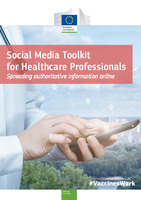| dc.description.abstract | Vaccines have saved hundreds of thousands of lives around the globe. Each year, vaccination stops 2.7 million people worldwide from getting measles, one million from getting pertussis and two million babies from getting tetanus. However, in recent years, vaccine delays and refusals have contributed to declining immunisation rates in a number of EU countries. Recent measles outbreaks – the highest in the EU for years - are an illustration of the impact of non-vaccination . The situation has become so serious that in 2019, the World Health Organization listed ‘vaccine hesitancy’ among the top ten threats to global health. The COVID-19 pandemic is another painful reminder of the costs associated with infectious diseases. An effective and safe vaccine against the virus is our best bet to achieve a permanent solution to the pandemic. Whilst vaccine hesitancy is not a new phenomenon, emerging technologies and social media platforms are making it quicker and easier to spread misinformation and sow doubts in the minds of the public. Anti-vaccination activists are also extremely organised in how they communicate their messages on social media, using all the tools available to disseminate their claims and challenge the beliefs of the hesitant part of the population. Studies show that these false messages are often liked and shared more than accurate messages and as such falsehoods surrounding vaccinations spread faster than truthful statements. Healthcare professionals play a key role in providing accurate information about vaccines and countering false narratives both in day-to-day interactions with patients and through their activity on social media. This document intends to guide you in that process. We lay out, in several steps, the proven approaches and strategies that can help react to this threat against vaccines and shift the narrative back towards science-based prevention. The time to act is now! |


